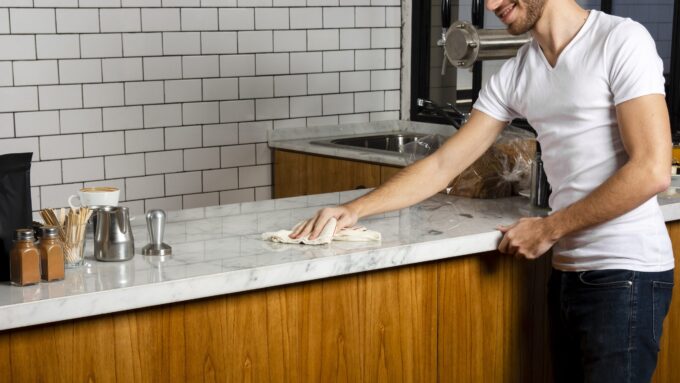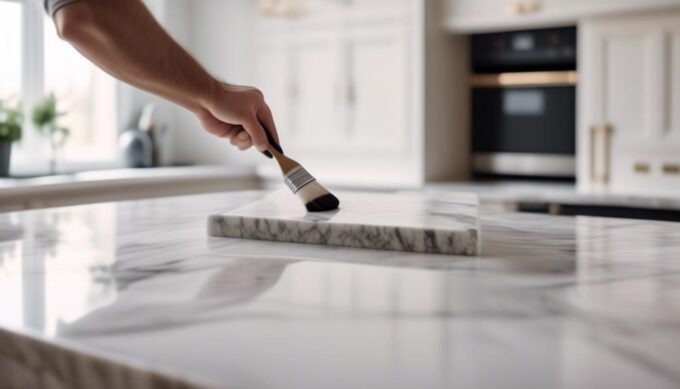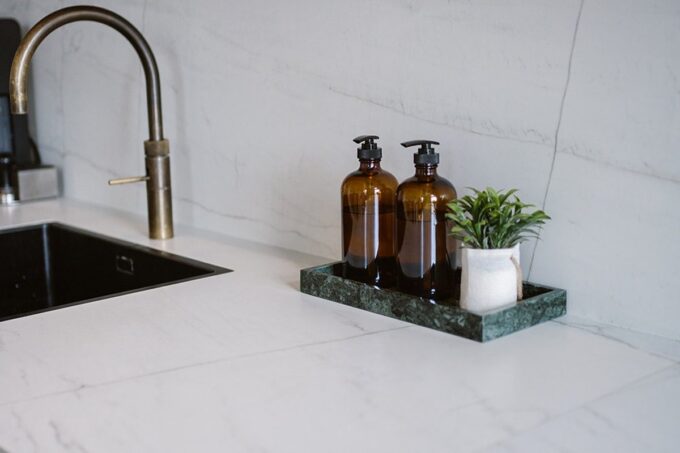Marble countertops bring timeless elegance to kitchens and bathrooms, but they need proper care to stay beautiful. One essential maintenance task is sealing. Neglecting this step can lead to permanent stains, dullness, or etching. As someone who has worked with natural stone for years, I’ve seen how the right care protects your investment and keeps it looking its best.
Key Points:
- Sealing prevents stains and damage.
- Frequency depends on marble type and use.
- Simple tests can reveal when sealing is needed.
- Correct preparation ensures effective results.
- Long-term care reduces maintenance frequency.
Why Sealing Marble Countertops Is Crucial

Source: geovastonesolutions.com.au
Marble is a porous material that absorbs liquids, making it vulnerable to stains from coffee, wine, or oil. Sealing creates a protective barrier that minimizes absorption, preserving the natural beauty of the stone. In my experience, sealing regularly keeps surfaces looking polished and prevents damage from everyday use. In case you need professional help for marble restoration and sealing, services like Renue Systems can keep your stone in top condition.
How to Test If It’s Time to Seal Your Marble
Testing is simple and avoids unnecessary resealing. Here’s how you can do it:
- Water Test:
- Pour a few drops of water on the surface.
- If the water beads up, the sealant is still effective.
- If the water absorbs, it’s time to reseal.
- Oil Test:
- Dab a drop of mineral oil on the surface.
- Wait for ten minutes and wipe it off.
- A dark spot indicates absorption, signaling the need for sealing.
Perform these tests every few months, especially on high-use surfaces. Regular checks save you from the headaches of dealing with permanent stains.
How Often Should You Seal Marble Countertops?
The frequency of sealing depends on the type of stone, its use, and the sealant quality. On average:
- Kitchen Countertops: Seal every 6-12 months due to frequent exposure to spills and acidic substances.
- Bathroom Vanities: Every 1-2 years, since exposure to moisture is lower.
- Low-Traffic Surfaces: Seal every 2-3 years, depending on usage.
In some cases, high-quality sealants can extend the intervals between applications. Always refer to the manufacturer’s instructions for best results.
Steps to Seal Marble Countertops

Source: allstonesolutions.co.za
Sealing your countertop is straightforward when done correctly. Follow these steps:
- Clean the Surface:
- Use a pH-neutral stone cleaner to remove dirt and grease.
- Avoid harsh chemicals that could damage the stone.
- Dry Completely:
- Ensure no moisture remains before applying the sealant.
- Apply the Sealant:
- Use a clean cloth or applicator to spread the product evenly.
- Work in small sections to avoid missing spots.
- Let It Penetrate:
- Allow the sealant to soak in for the recommended time.
- Buff the Surface:
- Wipe away any excess with a lint-free cloth.
- Buffing ensures an even finish without streaks.
Always wear gloves and work in a well-ventilated area. Proper application enhances protection and keeps the surface looking flawless.
Mistakes to Avoid During Sealing
Years of experience have shown me that small errors lead to big problems. Common mistakes include:
- Skipping Cleaning: Applying sealant over dirt traps grime, affecting the finish.
- Overapplying: Excess sealant leaves streaks and dull spots.
- Ignoring Drying Time: Rushing the process reduces effectiveness.
Avoid these pitfalls for a smooth and lasting result.
Tips to Extend the Life of Your Sealant

Source: homelifeandliving.nl
Proper care reduces the need for frequent sealing. Try these tips:
- Use Coasters and Trays: Prevent stains from drinks and oils.
- Clean Spills Immediately: Avoid letting liquids sit on the surface.
- Avoid Harsh Cleaners: Use mild, pH-neutral products.
- Place Cutting Boards: Protect against scratches and acidic food stains.
Good habits keep the surface pristine and reduce maintenance needs.
Long-Term Maintenance Tips
Maintenance goes beyond sealing. Regular cleaning and mindful use prevent damage. Dust surfaces weekly, use gentle cleaners, and avoid dragging heavy items across the stone. For stubborn spots, a professional restoration service can rejuvenate the surface without extensive effort on your part.
Conclusion
Sealing marble countertops protects their natural beauty and extends their lifespan. Testing, proper application, and mindful maintenance make a big difference. With the tips outlined above, you’ll keep your surfaces in top condition for years. Investing a little effort now saves time, money, and frustration in the future.



